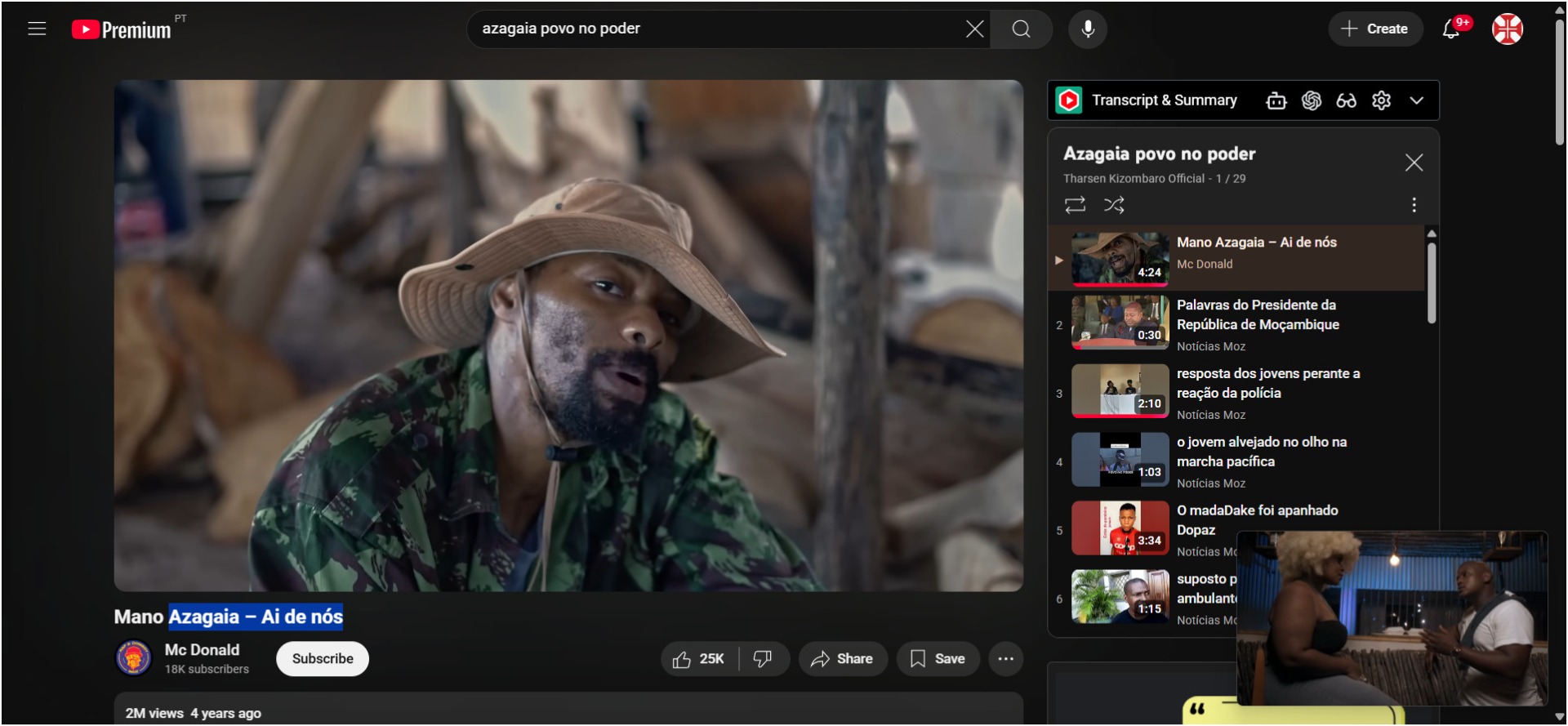mozambique music
Azagaia - A Voice for the Voiceless: Political Hip-Hop and Controversy
Azagaia, one of Mozambique's most influential and controversial rappers, whose music was a powerful force for social and political commentary. Born Edson Amândio Maria Lopes da Luz on May 6, 1984, in Namaacha, Maputo Province—near the border with Eswatini—he tragically passed away on March 9, 2023, at the age of 38 due to complications from an epileptic seizure (which he had managed for years, including a brain tumor removal in 2016). His stage name, derived from the Portuguese word for "assegai" (a traditional African spear), symbolized his sharp, piercing critiques of power structures. Raised by a Mozambican merchant mother and a Cape Verdean teacher father, Azagaia moved to Maputo at age 10, where he completed high school, studied geology at Eduardo Mondlane University, and immersed himself in basketball and music. Starting his career at 13 with the group Dinastia Bantu (releasing Siavuma in 2005), he quickly became a solo powerhouse, blending hip-hop with Mozambican rhythms and languages like Portuguese, Changana, and Tsonga.
In Mozambique's hip-hop scene, Jay Arghh emerges as a dynamic force, blending ancient African rhythms with modern trap, Afrobeats, jazz, and R&B to create a sound that's both deeply cultural and globally resonant. Born José Gil Chiquela Júnior in the 1990s in Maputo, Jay Arghh—whose stage name playfully adapts his initials "JR"—has become a beacon of the "new school" Mozambican rap movement. Influenced by his rapper brother Kamané Kamas and icons like Eminem, he's crafted a career marked by perceptive storytelling, social commentary, and infectious melodies. As a rapper, singer, producer, composer, and multi-instrumentalist, Jay Arghh's music tackles poverty, inequality, love, and daily life, inspiring youth activism while earning him over 11.1K monthly Spotify listeners as of September 2025. His journey from Maputo's streets to international platforms is a testament to his talent and vision for Mozambican music's global rise.
Azagaia's music was unapologetically activist, focusing on corruption, inequality, poverty, and government mismanagement under the ruling FRELIMO party. Dubbed "the people's rapper" and the most influential in Mozambique by 2014, his lyrics often drew from real-time events, turning songs into anthems for dissent. His debut solo album, Babalaze (2007, meaning "hangover" in Tsonga, via Cotonete Records), shattered local sales records with tracks like "Eu não paro" ("I Don't Stop") and "Alternativos" (featuring Portuguese rapper Valete). But it was the politically charged "As mentiras da verdade" ("The Lies of the Truth") that ignited controversy, criticizing elite hypocrisy and becoming a protest slogan. "A marcha" ("The March") called for youth-led action against corruption, while "Povo no poder" ("People in Power," 2008) became an enduring rally cry during the 2008 and 2010 uprisings over rising costs.
His work often led to clashes with authorities. After "Povo no poder," he was subpoenaed by the Attorney General for "threatening state security." In 2011, he and producer Miguel Sherba were arrested for cannabis possession (which Azagaia later said was medically prescribed for epilepsy), sparking accusations of political motivation. A second arrest in 2014 fueled similar claims. Songs like "Combatentes de fortuna" (2009, inspired by Zimbabwe's unrest, the most-viewed Mozambican rap video ever despite censorship), "Arriiii" (2010, on drug scandals and tax evasion), and "Emboscada" (2012, on RENAMO-FRELIMO tensions) kept him in the spotlight—and under scrutiny. State media frequently banned his tracks, yet they spread underground, empowering youth and fostering a revolutionary discourse in Portuguese laced with "Mozambicanisms."
Discography and Collaborations
Azagaia's output was prolific, with two major albums anchoring his catalog:
- Babalaze (2007): 13 tracks of raw hip-hop critique, breaking sales barriers and featuring local talent.
- Cubaliwa (2013, meaning "birth" in Sena, via Kongoloti Records): After three years of production, this sophomore effort included "ABC do Preconceito" (on prejudice) and "Homem Bomba" ("Human Bomb"). Guests included Stewart Sukuma, Dama do Bling (on "Cala-te Boca"), Banda Likuti, Ras Haitrm, Júlia Duarte, and Angolan rapper MCK. It spawned the "Bem-vindos ao Cubaliwa" tour with his band Os Cortadores de Lenha.
Singles like "Vampiros" ("Vampires," likening corrupt leaders to bloodsuckers), "Vender o Pais" ("Sell the Country," slamming resource exploitation), and "Ai Nhweee" (addressing Cabo Delgado's insurgency and climate issues) continued his legacy post-2013. Collaborations with Valete (six tracks total) and others like Deltino Guerreiro amplified his pan-Lusophone reach. His final concert was in December 2022 at Maputo's Centro Cultural Franco-Moçambicano.
Legacy: From Mourning to Revolution
Azagaia's death sparked massive unrest. Thousands marched in Maputo for his funeral on March 14, 2023, chanting his songs and clashing with riot police who used tear gas near the presidential palace. Authorized vigils on March 18 in Maputo, Beira, and elsewhere turned violent, with dozens arrested amid calls for "Povo no poder." Human Rights Watch condemned the excessive force. Culture Minister Eldevina Materula mourned him as a "unique rapper," while global artists like Valete, Gabriel o Pensador, and Kid MCK paid tribute.
His influence endures. In 2024-2025 protests against FRELIMO's disputed election victory (amid assassinations and police killings), "Povo no poder" became the unofficial anthem, chanted on streets and worn on T-shirts, fueling a "Mozambican spring." As a cultural icon, Azagaia reconstructed collective memory, promoting alternative governance and social justice through rap. His music streams on YouTube (Azagaia - Topic channel) and Spotify, with tributes like Valete's 2023 Lisbon concert. Though no major awards are documented, his impact rivals any trophy—he was the voice of Mozambique's youth, proving hip-hop's power in the fight for change.
